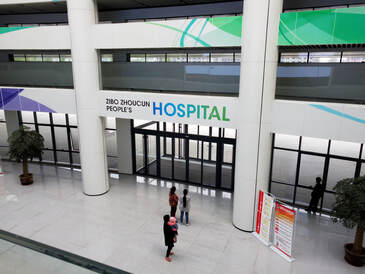 New hospital in a third-tier City in Shandong, China
New hospital in a third-tier City in Shandong, China I could quibble, but I'm not going to argue about that. What I took exception to was the blog writer's portrayal of a Chinese hospital and Chinese medical care as squalid and dirty. Overall, that's a misleading picture.
First, China has prosperous provinces (the ones on the coast, the ones filled with factories and trade) and it has poorer provinces. Better health care is available in the more prosperous areas and in the bigger cities. That applies to us as well -- if you live in a dinky little small town, there is no giant gleaming hospital down the road, is there?

Also, China abandoned communism a long time ago. Health care is not socialized. it's not free for everybody. When you go to the hospital, you register and pay some money and you get a smart card with your ID and your credits. Suppose you want to talk to a doctor. You then go to the relevant department and wait in the hallways until you get called into the consultation room.
The Chinese are, in my experience, more casual about the concept of medical privacy than we are in the West. Some other patient might come in to talk to the doctor while you're trying to talk to him. He slides your card through a little gadget attached to his computer and assigns the tests. Then you go line up in public to have your blood drawn; you are not whisked away to a little cubicle. You present your card again.
To get your blood results, you return in a few hours, insert your hospital card into a machine, and it prints out your results. Then it's back to talk to the doctor, if necessary. It's all very brisk and efficient.
But China is, on a per-capita basis, a much poorer country than the West, so yes, there are going to be clinics in rickety old buildings, and ancient-looking equipment. But China had advanced rapidly in economic terms, if not in terms of personal liberty.








 RSS Feed
RSS Feed